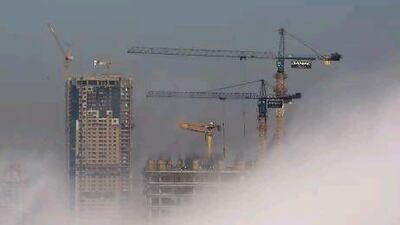The Gulf will struggle to meet ambitious government development plans amid a dwindling supply of credit from cash-strapped European lenders, Standard and Poor's (S&P) has warned.
The banks, which have typically supplied the majority of funding to infrastructure projects, are finding themselves with scant capital to invest, said Stuart Anderson, the ratings agency's managing director for the region.
"There is vast amount of infrastructure, much of which is attractive," he said. "But it's not going to get funded by governments, even with oil approaching US$120 per barrel."
Governments in the region have planned a number of grand projects as a means of boosting living standards for Gulf residents, from sewage works and metro systems in Kuwait to road and rail networks across the UAE.
All six GCC member states are currently expanding airport capacity, with the UAE alone planning two major airport upgrades and the opening of a third, Dubai World Central.
But the huge amounts of funding required from banks will be hard to secure, with many European lenders short of capital, Mr Anderson said.
"There are a number of European banks who certainly have the appetite for the Middle East … All these projects have funded themselves with syndicated loans," he said. "That cannot continue.
"And there are very high-quality projects out there which need to move on and need to be funded."
The ratings agency was advising governments to attempt to develop their bond markets to fill the funding gap, said Yann Le Pallec, S&P's executive managing director for Europe, the Middle East and Africa.
"Bank loans won't be enough by themselves in the region," he said.
European banks have cut lending lines to the region as a result of market headwinds emanating from the euro-zone's sovereign-debt crisis, which have left lenders racing to raise capital and fill a shortfall estimated at €78 billion (Dh377.94bn) by the European Banking Authority in December.
The Middle East historically underspent compared to the developed world on infrastructure investment, but began a burst of activity during the last decade, as oil prices rose and funds flowed into oil-rich Gulf states. Banks, flush with cheap liquidity at the time, were happy to oblige them.
But private-sector financing for such projects has become scarce since peaking in 2006, with the financial crisis causing a sharp drop in funding, according to data from the World Bank.
S&P has identified the Gulf's corporate refinancing needs for the year as between $45bn and $55bn.
As governments in the Gulf attempt to develop their abilities to tap credit markets, the UAE is not positioned particularly strongly compared with its neighbours, Mr Anderson said.
The Ministry of Finance said in June that it had delayed the UAE's first sovereign bonds until this year. A federal bond sale would replace the previous custom of emirates raising debt independently.
Other Gulf states have taken greater strides in developing bond markets, with Qatar recently gaining a lead over the Emirates with publicly listed treasury bills.
The UAE had much to gain from developing its bond markets to meet funding needs, economists said.
Following restructuring among Dubai's government-related holding companies, which have favoured bondholders over bankers, banks may be more willing to buy UAE bonds than lend directly, said Jean-Michel Saliba, an economist at Bank of America Merrill Lynch.
"If the capital markets are open, then you can expect to see some shift in issuances from loans to bond markets, particularly in the case of the UAE," he said.
twitter: Follow our breaking business news and retweet to your followers. Follow us

